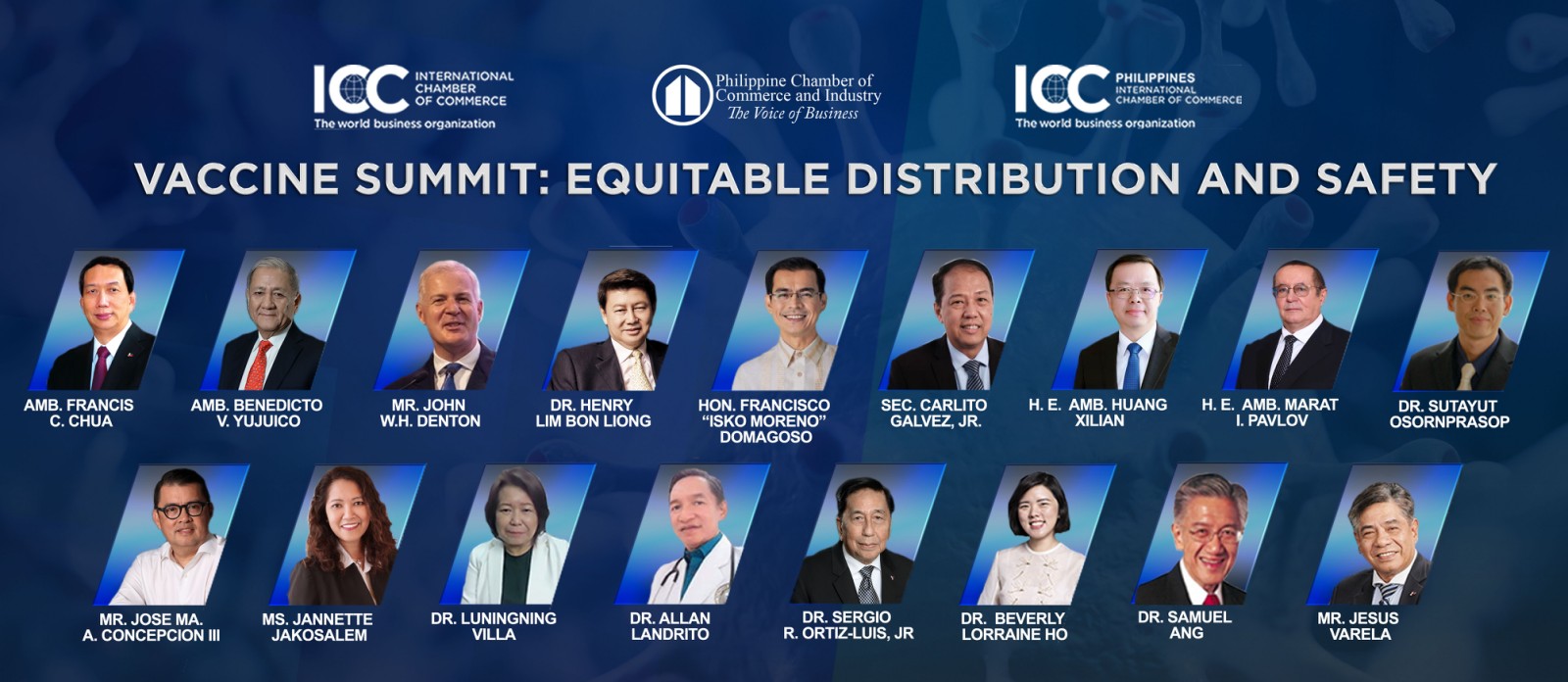Vaccination Summit: No One is Safe Until Everyone is Safe

Last April 30, 2021, CHiNOY TV hosted the Vaccine Summit: Equitable Distribution and Safety where key stakeholders in the country’s fight against COVID-19 shed light on the vaccine importation and distribution in both public and private sectors.
The online conference was a collaboration with the International Chamber of Commerce Philippines (ICCP), the Philippine Chamber of Commerce and Industry (PCCI), and the International Chamber of Commerce (ICC).
The four-hour event featured esteemed speakers from around the world who shared their knowledge, insights, and updates on the Philippines’ vaccination distribution. From Ambassadors of countries who are working with the Philippine government so that they may offer assistance, representatives from the private sectors making donations and assisting with purchasing and distributing the vaccines, to doctors who are working the frontlines and doing their best to treat and educate the public about the vaccines and the virus.
In his welcome remarks, Founding Chairman of ICCP and Chairman Emeritus of PCCI Amb. Francis Chua noted that the first batch of vaccines came in as early as the 28th of February. Thanks to the kind donation from China, the arrival of vaccines represents “some light at the end of the tunnel”. He also said the availability of vaccines for developing countries have biome a big global challenge that we ponder if these vaccines are effective or a health hazard by itself. These are the very reasons why we have this summit. President of PCCI Amb. Benedicto V. Yujuico reminded the viewers that the PCCI and the Philippines Business Community’s continued partnership with the government will help the country get back to normal sooner rather than later.
Sec. Carlito Galvez, Chief Implementer and Vaccine Czar of the National Task Force Against COVID-19, talks about the 3 year vaccination plan that will provide safe and effective vaccinations to the Filipinos for free, and how they are adjusting and adapting to the constraints of production capacity for the vaccinations. But he also notes that the Philippines has signed contracts with 5 different vaccination suppliers and that will help with the distribution in the country. This was achieved through the cooperation of both public and private sectors.
Ambassador of the People’s Republic of China to the Republic of the Philippines, H. E. Amb. Huang Xilian, reminds us that the most urgent task in the community is fighting the COVID-19 pandemic. The vaccinations will keep the community protected and help save lives. He highlights that the Chinese President Xi Jinping has solemnly declared that the COVID-19 vaccine once developed and deployed by China will be made a global public good, and it will be China’s contribution and assistance to developing countries. More than 240million doses have already been administered, with the goal of 1.1billion doses administered by the end of July.
E. Amb. Marat I. Pavlov, the Ambassador of the Russian Federation to the Republic of the Philippines, notes the importance of summits like this in order to exchange information and knowledge about practices that may help in containing the COVID-19 virus. The Russian government firmly believes in the development of the vaccine and doling it out to achieve a herd immunity. The Sputnik V, the COVID-19 vaccine made in Russia, shows an efficacy of 97.6% with no adverse side effects, aside from those that are typical to all vaccinations, such as skin irritation. Russia is now in the last stretch of negotiations with the Philippine government in order to provide our country with vaccination doses.
Dr. Sutayut Osornprasop, Senior Human Development Specialist for the Global Practice on Health, Nutrition, and Population of the World Bank Group, informs us that according to a survey, 40% of households suffered income losses in 2020 due to the pandemic, and poverty has increased by 3%. This highlights the importance of proper implementation of the country’s vaccination program in protecting lives and stimulating economic recovery.
The ICC’s secretary general, Mr. John Denton promised that ensuring a truly global equitable distribution of vaccines is the ICC’s #1 priority. To quote Mr. Denton, “No one is safe until everyone is safe.” The current production scale for the vaccines is better than was predicted by experts, and Mr. Denton noted that governments should lift restrictions for better and easier distribution of vaccines.
Dr. Henry Lim Bon Liong, President of the Federation of the Filipino-Chinese Chambers of Commerce (FFCCCII) shared that “[The FFCCCII], with the help of the Ambassador of China, aims to protect our senior citizens and economic frontliners, entrepreneurs, and employees who are breadwinners.” Reminding us that the vaccination does not only help the individual, but helps protect the community, as well.
Mayor Isko Moreno shared that Manila is actually having a good problem right now as there was once such a reluctance to get vaccinated, but now there is a high demand for it. While most doses are made up of Sinovac, Astrazeneca was also distributed in Manila, where there is a simplified deployment system while keeping with the IATF rules.
Presidential Adviser for Entrepreneurship Mr. Jose Ma. “Joey” Concepcion III relayed that the private sectors donated 50% of their purchased vaccines for the government to distribute. The private sector realized how big an impact they can have on the distribution of vaccines and have taken steps to do their part. Mr. Concepcion noted that now is the best time to start getting vaccinated in order for the economy to be able to open back up by the 4th quarter, when the holidays are near. The ultimate goal for him is that even small businesses are able to survive this epidemic.
For vaccination systems to be efficient and effective, it must be backed up by a solid digital system. And we couldn’t agree more with Ms. Janette Jackosalem, Chief Business Officer of Zuellig Pharma Corporation. She also put emphasis on bayanihan and how important it is that we work as a nation to combat this virus.
The Medical and Regulatory Affairs Director of Faberco Life Sciences, Inc., Dr. Luningning Villa highlighted the importance of vaccines in combating communicable diseases that are airborne or those that affect the respiratory system. Covovax has high efficacies against the original and emerging strains of the virus, and is in fact the first vaccine that has shown clear evidence of its efficacy against the UK and South African strain of the COVID-19 virus.
Dr. Sergio Ortiz-Luis, Honorary Chairman and Director for CSR of PCCI, recalled that earlier in the pandemic he had friends and relatives that were affected by COVID-19 and at the time, there were very low chances of recovery. Many people did not have access to hospitals and medication so they put their trust in paracetamol and medication that they knew. Today there are now a number of protocols to help combat the virus.
Dr. Allan Landrito brings up Ivermectin as a treatment for COVID-19 and while he did say that it can help in terms of prevention and may serve as a bridge to the vaccine, it by no means is an alternative to getting vaccinated. Dr. Samuel Ang however, tells us the jury is still out on Ivermectin, but does agree that COVID-19 treatments have vastly improved.
As Director for Health Promotion and Disease Control at the DOH, Dr. Beverly Lorraine Ho shared how the pandemic exposed weak spots in our public health care system due to years of underinvestment. It emphasized the importance of health care infrastructure in areas like epidemiology that would have helped with contact tracing. There was also a need to inform the public and the healthcare providers of which interventions are evidence-based in order to avoid wasting money on ineffective treatments, and giving people false sense of security. The vaccines are shown to have worked and that is why the government has implemented a grand vaccination plan that is 37 times bigger than any other vaccination program.
Mr. Jesus Varela, Chairman of GS1 Philippines, Inc. and Director General of the ICCP, made a point of talking about substandard and counterfeit medical products. The use of GS1 global standards will help with traceability of the distribution of medication, ensuring that everyone is properly vaccinated and protected from the COVID-19 virus.These are only a few of the conversations and information shared at the summit. Listening to the speakers offers us all a light at the end of the dark tunnel we have been trudging through this past year, reminding us that efficient and equitable distribution of the vaccine will finally allow us to build ourselves and the country back up. If you want to know more about this, you can watch the full video here: (1) Facebook.
